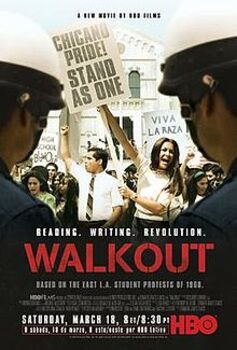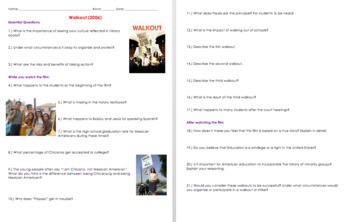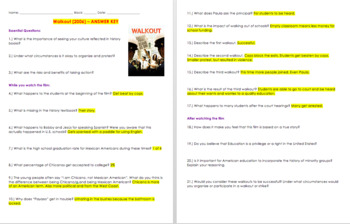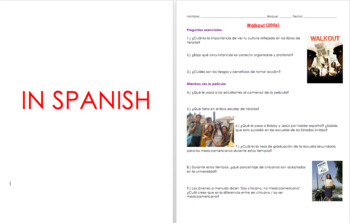Walkout Movie Guide Questions in English & Spanish. Chicano Movement Film
- Word Document File
What educators are saying
Description
2 Movie Guides. 1 completely in English and 1 completely in Spanish. 21 Movie Guide Questions in chronological order that include pre-listening questions, questions to answer during the movie, and reflection/analysis questions that can also serve as discussion questions after the movie. This film highlights the importance themes of Chicano civil rights, bilingual education, equality vs. equity, Spanish instruction in classroom back when it was prohibited to speak Spanish and punished. Rated PG-13 and perfect for any classroom! Includes Answer Key.
I had to watch this film in my Latino Labor History course in college and everyone cried!
- Rating: PG-13
- Genre: Documentary, Drama
- Directed By: Edward James Olmos
- Written By: Ernie Contreras, Jordan Roberts, Timothy J. Sexton, Marcus De Leon
- In Theaters: Mar 18, 2006 Wide
- On Disc/Streaming: Mar 6, 2007
- Runtime: 111 minutes
- Studio: HBO Films
Walkout is the true story of a little-known but profoundly significant moment in the history of the Latino community in East Los Angeles. In 1968, Lincoln High School honor student Paula Crisostomo (Alexa Vega), outraged at the shabby treatment afforded Chicano students in the L.A. school system -- including habitually lowered expectations, poor facilities, a total absence of bilingual courses or textbooks, unfairly administered penalties for slight infractions, demeaning corporal punishment, and out-of-hand refusal to write letters of recommendation to choice colleges -- challenges the authority of her elders for the first time in her life by organizing a mass student walkout at five barrio high schools. Mentored by dedicated young teacher Sal Castro (Michael Pena), Paula and her fellow student activists intend to make their protest a peaceful one, but the L.A. cops typically use brute force to quell the "radicals."
Even when it seems that the school board will capitulate to the Chicano students' demands, the kids are betrayed (there's an undercover police officer in their midst) and the leaders of the walkout are threatened with lengthy prison sentences on trumped-up "conspiracy" charges. It will not spoil the ending of the film to reveal that the students are ultimately successful; as directed by actor Edward James Olmos (who also plays one of the school board members), the dramatic thrust of the story is the lasting effect that the protest has on its participants -- especially the idealistic Paula Crisostomo.
Executive producer Moctesuma Esparza, who'd been one of the original walkout organizers back in 1968, spent a full two decades getting this story on film; Esparza is played by Bodie Olmos, son of the director, while Esparza's daughter Tonantzin Esparza is seen as Vickie Castro. Also, Paula Crisostomo's daughter Marisol Crisostomo-Romo is seen as Mita -- and in addition, several of the former student activists are interviewed during the closing credits, or appear as extras in the crowd scenes. Produced for HBO, Walkout originally aired on March 18, 2006.
Se relaciona a los temas de AP Spanish Language and Culture:
Identidades personales y públicas | Identidades privadas y públicas
- Contexto l La enajenación y la asimilación
- Contexto 2 La autoestima
- Contexto 3 La identidad nacional y la identidad étnica
- Contexto 4 Los intereses personales
- Contexto 5 Las creencias personales
- Contexto 6 Los héroes y los personajes históricos
Personal and Public Identities | Private and Public Identities
- Context l Disposal and assimilation
- Context 2 Self-esteem
- Context 3 National identity and ethnic identity
- Context 4 Personal interests
- Context 5 Personal beliefs
- Context 6 Heroes and historical figures
AND
Las familias y las comunidades
- contexto 1 Las comunidades educativas
- contexto 2 Las redes sociales
- contexto 3 La geografía humana
- contexto 4 Las tradiciones y los valores
- contexto 5 La ciudadanía global
- contexto 6 La estructura de la familia
Families and Communities
- context 1 Educational communities
- context 2 Social networks
- context 3 The human geography
- context 4 Traditions and values
- context 5 Global citizenship
- context 6 The family structure





